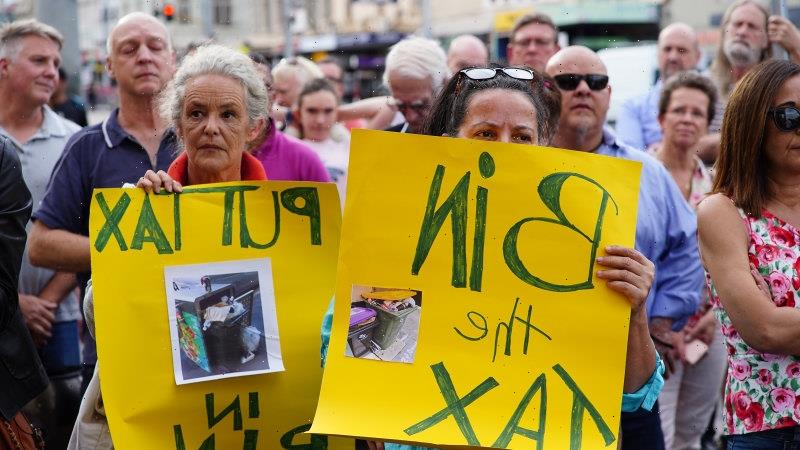More than 100 residents chanted and demonstrated on the steps of Richmond Town Hall before Yarra council voted on Tuesday night to levy a separate waste charge on ratepayers that has been adopted by all other 78 Victorian councils.
In an extraordinary step, the City of Yarra chambers – a frequent site for protests from the Yarra Residents Collective community group in the past year – deployed security guards for its monthly meeting.
Residents rally outside Richmond Town Hall on Tuesday night.Credit:Luis Enrique Ascui
Opponents of the new charge – including independent councillors Stephen Jolly, Bridgid O’Brien and newly elected councillor Michael Glynatsis – described the separate charge as an unjustifiable “bin tax” imposed on residents with no consultation.
“Any counsellor tonight that votes for the bin tax, they will be binned at elections next year,” Jolly told the crowd, which broke into chants of “bin the tax”.
But council officers dismissed the criticism, saying the charges were in line with other councils and a financial necessity in the face of mounting landfill and costs associated with the state government’s new four-bin system.
The council’s annual bill for sending residential rubbish to landfill has increased 90 per cent over the past three years to $1.8 million, according to documents published before Tuesday’s meeting.
“The costs of waste and recycling is continually outpacing the rate cap,” Yarra’s acting general manager of corporate services, Wei Chen, stated in the agenda papers. “This increase is well above the amount councils can raise through rates alone.”
Councils are circumventing the Andrew’s government rates-cap rules, which allow rates to increase 3.5 per cent from July 1, by separating charges for rubbish and recycling on residents’ rates notices.
By splitting the waste charges from the overall rates, councils are able to increase the total amount beyond the rates cap. Although the council documents noted the new charges cannot “result in a windfall gain to the council”, according to compliance guidelines from the Essential Services Commission.
Chen said in council documents this would be “achieved by reducing general rates by the equivalent value”.
The council asserts the charge would result in an increase of between $12 and $115 for residents who receive kerbside bin collection – about 86 per cent of the community. Those who don’t would see a reduction in rates in the coming year, according to the documents.
But concerned residents, and the dissenting councillors, have argued the council should find efficiencies elsewhere, including in staffing, to make up the shortfall.
“This council has a spending problem,” said Adam Promnitz, founder of the Yarra Residents Collective. “They’ve shown no display of any desire to cut other costs whatsoever.”
Opponents also criticised a lack of public consultation before putting the new charge to a vote. Chen said in the council documents the council should be “transparent about the minimal level of community influence the community can have over the ultimate decision”.
A change.org petition against the move had on Tuesday reached more than 5100 signatures, and the three councillors opposed to the charge have conducted public meetings in recent weeks.
The inner-city council, which recently lost its Greens-majority, attempted unsuccessfully to introduce a $247 waste charge in 2017 after public outcry. Other council services would need to be cut back if the vote fails again, the officer’s report warns. Rates make up about 60 per cent of annual income for the council.
Of Victoria’s 79 councils, 76 already have a separate waste levy – some dating back five years.
Aside from Yarra, Whitehorse and Hume are the only councils yet to adopt the charge, but both have already voted to do so and the charges will begin appearing on rate notices from July.
At least one council has been caught out in the past gouging residents for waste fees; Wodonga Council was called out by the Victorian Ombudsman in 2018 for overcharging its residents by $18 million.
Councils are legally allowed to separate charges from rates and apply “reasonable charges”, which are to be monitored by the Essential Services Commission.
A spokeswoman for the commission said it would “expect” councils that are introducing new waste charges to “demonstrate that the overall impact on ratepayers is neutral, but we do not approve council rates on waste management charges”.
The Morning Edition newsletter is our guide to the day’s most important and interesting stories, analysis and insights. Sign up here.
Most Viewed in National
From our partners
Source: Read Full Article




